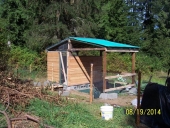posted 6 years ago
I'm really sorry that you lost another duck. Are you sure of what's taking them?
No matter what materials you choose to make a portable shelter out of, there will be upsides and downsides. There's pollution, availability, ease of working with it, biodegradability and most of all, weight.
1. At 115 lbs, portable shelters, even with wheels, and on soft ground, very quickly get beyond my mass to move. I'd rather build a light shelter and have to stake it down, than have it "turn stationary" because it's a pain to move.
2. Friction is real! I have some small portable shelters which use 2" PVC pipe on the base, and 1" PVC hoops for the top, and the large, smooth pipe slides really easily on grass.
3. It's wet here all winter. If wood was cheap to buy or I had a way to turn trees into lumber on my land, I would accept its ability to rot, but neither is the case, so I admit I'm looking for things that cope with wet.
4. I've totally given up on chicken wire. It might keep chickens in until it rusts through, but it won't keep anything else out! Hardware cloth is harder to work with - one would think that on the scale it is made it could be square, but it only "pretends" to be square!
5. Aluminium is lovely to work with and light, but up here, its price has sky-rocketed. I've used it with stainless bolts and nylocks (locking nuts) to build things. I scored a damaged aluminium ladder which I cut on an angle, covered with hardware cloth and made two ramps - one for the Noisy ducks and one for the geese - the Muscovy have been seen using it, but they don't *need* it! So consider watching for anything aluminium that can be chopped up/repurposed/used as a framework.
6. I *really* like the idea of having multiple paddocks that I can rotate the birds through, but I'm not there yet. My "quackie" ducks are in a stationary run, and my goal this winter is to build them a second run. The only way I'll get a 3rd and 4th run where their shelter currently sits, is to make a "duck tunnel" of some sort. I mention this, as a way to encourage long term thinking.
7. Portable shelters don't go "over" either rough terrain or higher plants. The birds can't move to find shade, although so long as the ducks can get wet, overheating isn't the concern it might be. We've had some "hot for us" days this summer when I had to put sprinklers on my husband's egg-mobiles to keep his girls cool.
I suggest that you google images for chicken/duck runs and look at as many as you can and consider the things you like or don't like about them. I know of many that appealed to me on first look, but they either end up stationary because they're heavy, fall apart due to under-engineering, or are just too small to be useful. Adding "cheap" to that equation, which my first shelter was, and at least it may teach you how you want to improve the next one. That said, my cheap, mostly second hand shelter lasted some time before it rotted.

 3
3




 5
5




 1
1




 1
1





 2
2




 3
3




 3
3











 2
2




 2
2











 1
1




 2
2




 1
1




 5
5











 5
5








 1
1




 4
4











 2
2




 1
1




 1
1




 1
1














